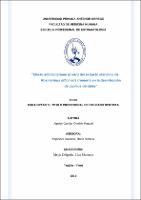| dc.contributor.advisor | Espinoza Salcedo, María Victoria | |
| dc.contributor.author | Aguilar García, Cynthia Raquel | |
| dc.creator | Aguilar García, Cynthia Raquel | |
| dc.date.accessioned | 2019-12-12T21:48:42Z | |
| dc.date.available | 2019-12-12T21:48:42Z | |
| dc.date.issued | 2019 | |
| dc.identifier.uri | https://hdl.handle.net/20.500.12759/5774 | |
| dc.description.abstract | Evaluar la efectividad antibacteriana in vitro del extracto etanólico de Rosmarinus officinalis (romero), en la desinfección de cepillos dentales.
Material y Método: El estudio fue experimental. Se trabajó bajo una concentración de 75 mg/ml del extracto de R. officinalis y se comparó con el control positivo gluconato de clorhexidina al 0.12%. Las placas de agar sangre sembradas e inoculadas con la mezcla del extracto etanólico de romero y los microorganismos extraídos de los cepillos dentales, fueron incubadas a 37°C, durante 24 y 48 horas. La lectura se realizó mediante la determinación de unidades formadoras de colonias (UFC). Estos fueron analizados empleando la prueba de comparación de medias, utilizando la distribución T de student con un nivel de significancia del 5%.
Resultados: Los microorganismos extraídos de los cepillos dentales fueron susceptibles a la acción del extracto etanólico de romero.
Conclusiones: el extracto etanólico de Rosmarinus officinalis (romero), mostró efectividad antibacteriana en la desinfección de cepillos dentales. | es_PE |
| dc.description.abstract | To evaluate the antibacterial effectiveness in vitro of the ethanol extract of Rosmarinus officinalis (rosemary) in the disinfection of toothbrushes. Material and Method: We worked with a concentration of 75mg / ml of the extract of R. officinalis and compared with the positive control chlorhexidine at 0.12%. The blood agar plates seeded and inoculated with the mixture of the ethanolic extract of rosemary and the microorganisms extracted from the toothbrushes were incubated at 37 ° C, for 24 and 48 hours. The reading was done by determining colony forming units (UFC). These were analyzed using the means comparison test, using the student's T distribution with a significance level of 5%. Results: our findings show that the microorganisms extracted from toothbrushes were susceptible to the action of Rosmarinus officinalis extract. Conclusions: the ethanol extract of Rosmarinus officinalis (rosemary), showed antibacterial effectiveness against the disinfection of toothbrushes. | en_US |
| dc.description.uri | Tesis | es_PE |
| dc.format | application/pdf | es_PE |
| dc.language.iso | spa | es_PE |
| dc.publisher | Universidad Privada Antenor Orrego | es_PE |
| dc.relation.ispartofseries | T_ESTO_619 | |
| dc.rights | info:eu-repo/semantics/openAccess | es_PE |
| dc.rights.uri | https://creativecommons.org/licenses/by/4.0/ | es_PE |
| dc.source | Universidad Privada Antenor Orrego | es_PE |
| dc.source | Repositorio Institucional - UPAO | es_PE |
| dc.subject | Romero (Rosmarinus officinalis) | es_PE |
| dc.subject | Cepillos dentales | es_PE |
| dc.subject | Microorganismos | es_PE |
| dc.title | Efecto antibacteriano in vitro del extracto etanólico de rosmarinus officinalis (romero) en la desinfección de cepillos dentales | es_PE |
| dc.type | info:eu-repo/semantics/bachelorThesis | es_PE |
| thesis.degree.level | Título Profesional | es_PE |
| thesis.degree.grantor | Universidad Privada Antenor Orrego. Facultad de Medicina Humana | es_PE |
| thesis.degree.name | Cirujano Dentista | es_PE |
| thesis.degree.discipline | Estomatología | es_PE |
| dc.subject.ocde | https://purl.org/pe-repo/ocde/ford#3.02.14 | es_PE |
| renati.type | https://purl.org/pe-repo/renati/type#tesis | es_PE |
| renati.level | https://purl.org/pe-repo/renati/level#tituloProfesional | es_PE |
| renati.discipline | 911016 | es_PE |
| dc.publisher.country | PE | es_PE |


